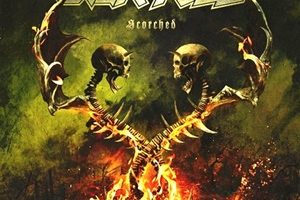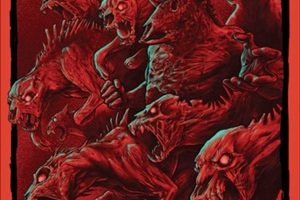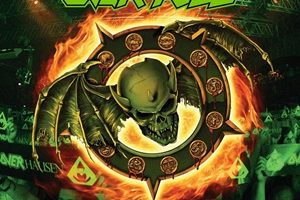Overkill – Surgical Precision
Monday, 11th March 2019
Much like cockroaches that infest the Earth, metal music and its supporters will never die. Thanks to the output of bands like Overkill, second and third generations of followers develop – latching onto the energy and excitement that the riffs, tempos, and hooks deliver on both the music and vocal sides of the equation. The Wings of War is the band’s nineteenth studio album – their first with latest drummer Jason Bittner – and continues the intense thrash and groove approach that has been a staple since the band’s inception in the 1980s. It keeps up with the three-prong punk/metal/rock and roll attack that makes Overkill over the top and loved by many from the US to China, Australia to Brazil, and all points in between.
Settling in on a late weekend afternoon with vocalist Bobby Blitz, it’s easy to just let the topics flow. Beyond the latest drummer acquisition, we handle everything from global touring, how the band was able to make it through the tougher transitions from major to independent label status in the 1990s, and how integrity has played a part in maintaining the band’s status in the scene.
Dead Rhetoric: The Wings of War is the new Overkill album – to these ears another three-dimensional output full of versatility in terms of punk-tinged action, some straight grooving hard rock and roll, and of course the traditional metal influences that penetrate the thrash style you’ve always represented. What’s your assessment at this point of the songs and performances? And where do you see it sitting in the discography?
Bobby Blitz: Good! [Laughs] You kind of said it all. I was listening to what you said as you give your synopsis of it and I felt like saying after every short statement “agreed” (laughs). Until it came to the question. I think it’s something that could mark let’s say a new chapter for us. Obviously our chemistry has changed, Jason Bittner is in the band. We embrace that chemistry and created something that we weren’t sure what we were creating at the time, but actually turned into something that makes us feel very successful. Because of the different nuances from the inside, because of embracing the classic, NWOBHM riffs and adding some punk to it, putting an Overkill stamp on it. The idea for us at the end of the day is we don’t have an identity crisis, it’s really easy to put the Overkill stamp on things. It’s more about what these interior changes within the band are going to do- and I think in this case it is successful.
Dead Rhetoric: You have a new drummer in veteran kit man Jason Bittner, who’s worked with everyone from Anthrax and Flotsam and Jetsam to Toxik and Shadows Fall to name a few. Where do you see his style in comparison to previous Overkill drummers – and does it feel strange to have someone who followed your output in the ’80s and ’90s as a fanboy now in the band?
Blitz: You’ve probably read this, but Jason used to pull up at our shows in upstate New York with two drum sticks in his back pocket -I didn’t even know his name at the time because there’s ten years difference in our age. I used to call him Sticks- and I would say, ‘hey Sticks- are you waiting for Tim Mallare to drop dead so you can fill in?’ (laughs). And he would always let us know that he was ready. It’s a no-brainer- and he’s technically very schooled. The point is he’s probably the most trained musician we’ve ever had in this band. One of the things he brings to his playing is sort of surgical precision. If it’s how you ask him to play, he’ll do it – or he’ll suggest a change and it’s something that because of his abilities he can do on the spot. It gives us so many avenues and roads to look down. I think he was instrumental in making this record what it was, if I have to say why, because of that surgical precision.
Dead Rhetoric: “Welcome to the Garden State” as a song and video choice features all the sights, sounds, and images/scenarios that makes New Jersey so special in the United States. How did this track develop, and who came up with the idea to put in a bit of the Bruce Springsteen feel at the end?
Blitz: [Laughs] We’ve always worn the home state of New Jersey on our sleeve. Even D.D.’s stage vest has a south Jersey patch on the back like a rocker. We’ve always been proud, it’s a work ethic thing. I suppose to some degree this is a throwback all the way to Ellis Island and immigration. Both D.D. and I, our grandparents were not born in this country. The ideas of this are how we grew up, we thought locally and acted globally with this. All we are doing is talking about stuff that we know about. The whole idea of this was Verni’s – and even the Bruce Springsteen thing, he had done cuts of it in his home studio, asking me what I thought of it. I was holding my stomach, thinking it was hysterical, because he had cut the original “Born to Run” into a slower version of “Welcome to the Garden State” and we had to try doing this. It came out seamless. It’s a nod to where we are from, and the attitude and balls to record it and put it on this record.
Dead Rhetoric: How hard was it for you to do the final screams on “Head of a Pin”?
Blitz: That was like a one-taker. That wasn’t hard for me to do. I’ve stopped smoking now, (I’m) in my seventh year without cigarettes. It’s changed a whole lot of range in my voice- if you’ve followed the band, you can probably trace the progression. I have higher highs, and even in some cases, lower lows. I’m in a position this late in my career to be able to challenge myself to do different things or try different things. Which keeps that interest up, you know? This becomes another nuance, to compete against myself on the last record because I think I can do it and I want to try it. It wasn’t that hard to do, but I agree with you it sounds like someone getting burned by a cigarette.
Dead Rhetoric: What do you believe Chris ‘Zeus’ Harris adds to the final mix/master for this effort in comparison to who you’ve used in the past?
Blitz: We’ve used Andy Sneap on the record prior to this, I love his work on The Grinding Wheel, but he was unavailable. Jason and D.D. have worked before in the past with Zeus, and it wasn’t like he was number two. It’s just a different type of production. I think he gives it a little more organic drum sound, and he brought it out to a wider production. It has an appearance of everything louder than everything else, and it’s really what I like. It takes over a room or a stereo. I think what he brought to this was force, I would say. With regards to how it comes out sounding from the speakers, it sounds serious and for sure takes over a space.
Dead Rhetoric: Considering the type of metal you play, do you find you have to put yourselves in sort of specific prime state for your best output, be it the studio or the stage?
Blitz: That’s interesting. I never really have thought about that, I like recording my vocals separately from the guys- and I only do that because I like to sing continuously instead of talk about what I’m singing with other people. Obviously, I value their opinions and with modern technology, they can hear it ten minutes after I’m done singing it. I like to work on a roll, so I work with this guy named Johnny Rod – I like working with him because it’s not heavy, it’s light but we are serious about what we do. It’s a relaxed situation, and it has to be relaxed for the studio to be enjoyable. Even when it comes to playing live, I get relaxed after the first song. The first one, when I’m waiting in the wings, my stomach is turning upside down. To this day, I can still get those butterflies. For me to perform in the correct manner, I have to be relaxed.
Dead Rhetoric: How does it feel to now be touring in so many new markets and territories over the past decade that were never attainable during the first wave of thrash in the ’80s and ’90s? Do you find that metal crosses not only races, genders, and cultures – but generations?
Blitz: For sure- this is multi-generational, without a doubt. That’s one of the reasons that the scene is so healthy. This is music that fathers have passed on to their sons and daughters – or mothers onto their daughters and sons. Or grandfathers getting involved. It’s just the value in the music. I’ve always been a firm believer in the fact that the reason people are so attracted to this music is it fills some sort of spiritual need. It doesn’t matter what you are on the outside, it matters when you put on the uniform of the black shirt, the jeans, and you are in the third row of the pit, you are one of the army, a part of it. It has nothing to do with your politics or your social aspirations. It becomes a level-izer because of that.
We’ve been able to see in multiple countries a following and the ability to tour that in the 1980s was unattainable. Places in Asia, we’ve been to China for the first time, we’ve been to Australia, there’s a festival in Iceland that I would love to get on because I’ve never had the opportunity to play there. I think the health of the scene obviously has given me a geographic bucket list – the resurgence to full health in this millennium.
Dead Rhetoric: What would you say have been the keys to not only rising to a level of respect and success as Overkill – but maintaining it through thick and thin?
Blitz: I think it’s internal. You aren’t thinking about the outside – to answer your question, it’s more about ‘I’m not doing that- that’s not like me!’ (laughs). I can’t do that- that’s against my principles. And I think we’ve always had principles. We may not have recognized them in the early days, but looking back you can see we were pig-headed. We knew what we were- we weren’t searching out popularity, we were searching out ways to have what we loved thrive. And that comes across to people at a time that we are the real deal. You put me in a room with a hundred guys in metal bands, I can tell you in two minutes who the real deal is- and who is not! That’s something I’ve acquired over the years but has become a part of the band’s presentation.
Dead Rhetoric: This integrity, do you believe it’s helped you survive the changes when you moved from a major label to independent status when metal changed during the 1990s?
Blitz: I think it made us who we were. We may have been those people prior, but now we had a chance to use those tools. If I was sitting in my parents basement playing guitar wondering why nobody appreciated my genius as opposed to figuring out how to get this done during the lean times with a partner who had exactly the same aspirations, it’s not the event that made us who we are — it’s how we reacted to that event that made us who we are. It’s one of the prouder moments in my career, doing it when it wasn’t easy. The point is, when the health came back to the nearly deceased scene, we were ready. We had been touring, we had released records on a regular basis. We didn’t change our schedule because somebody told us that we weren’t popular. We didn’t care if we were popular before, so what does that have to do with us?
Dead Rhetoric: Do you believe the fact that you also took control of the management side of the band also helped weather this storm?
Blitz: It’s a business understanding. This is a multi-faceted business plan here. The ultimate thing is, are you doing what you love within that business plan. To have a business that is working or thriving, you have to have a positive cash flow. We knew that from our parents- my father worked for himself, so did D.D.’s father. We knew that from when we were kids – so the ideas, all we had to do was apply that to our situation. Were we going to have the backbone to see this through? This is a moot point because it’s in the past – we had the backbone to see it through. I think we were just prepared for that whole scene.
Dead Rhetoric: D.D. released a solo album last year – ever have any thoughts of stretching your creative wings and doing a solo effort of your own, or are you pretty content to say what you need to say within the Overkill umbrella?
Blitz: I’ve done stuff with Metal Allegiance. I released a record ten or eleven years ago called The Cursed, it never came up on radars because it was the label’s going into the shitter as soon as the record hit the stands. There was about 1,000 of them sold, so it’s an under the radar thing. It’s more of a bluesy rock and roll, doomy sort of approach. I took my voice into another realm on that- I spent two months singing the essential Johnny Cash to understand that there were other places to do with my voice. I have done it, but it’s probably not well known- still a hugely satisfying event in my career.
Dead Rhetoric: What’s on the agenda for Overkill for the rest of 2019 into 2020?
Blitz: We are at the touring stage at this point. We’ve worked on that clock for how many decades- it’s really about write, demo, work the songs out, record the songs, mix, promote, release, tour. And now we are at the tour part – we have Flotsam and Jetsam and Destruction over in Europe, we have Death Angel and Act of Defiance in the US. Life of Agony will be on the New York show. There are two other tours being planned – a second European and US tour, which take place in the summer. During the summer too we will be taking treks over to Europe to do their festival season. We have the MegaCruise coming up. I’m stacked up until Thanksgiving. There is snow on the ground now, when I stop touring for this record, there will be snow on the ground again. (laughs).




























